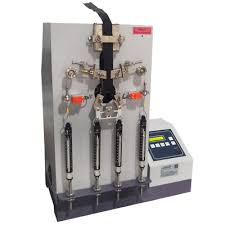Repeatedly opens and closes zippers under tension to test durability and cycle life.
WhatsApp : +86 13816217984
Email : info@qinsun-lab.com

The functional life of a zipper is often determined by its ability to withstand numerous opening and closing cycles without failure. A Zipper Fatigue Tester provides a standardized method to assess this characteristic, commonly referred to as reciprocation or cycling resistance.
The test involves mounting a specimen of the zipper onto the tester. The zipper tapes are typically held securely at each end, and a specified lateral or transverse tension (or a combination) may be applied to simulate the stresses encountered in a finished product. The zipper slider is then grasped by a mechanism on the tester. A motorized drive system moves the slider back and forth along the zipper chain, causing the zipper to repeatedly open and close over a defined stroke length.
The instrument is used in laboratories for:
Determining the number of cycles a zipper can withstand before functional failure.
Evaluating the durability and lifespan of various zipper types (e.g., coil, Vislon, metal) and sizes.
Quality control during zipper manufacturing to ensure consistent performance.
Assessing the effect of different materials, designs, or finishes on zipper fatigue life.
Research and development of more durable zipper components and assemblies.
Ensuring zippers meet the performance requirements for the products they will be used in (e.g., heavy-duty applications vs. light apparel).
ASTM D2060
BS 3084
JIS S3015
DIN 3416
Provides objective, quantitative data on zipper durability under repeated opening and closing cycles.
Essential for predicting the service life of zippers and ensuring product quality and reliability.
Helps ensure zippers maintain smooth operation and structural integrity over time.
Standard compliant test methods (ASTM D2060. BS 3084) are widely used for zipper performance evaluation.
Allows for testing under controlled conditions of tension, speed, and stroke length.
Useful for quality control, product development, and material comparison.
Testers often have multiple stations for efficient testing of multiple samples.
Based on typical Zipper Fatigue Testers:
Mounting fixtures to securely hold the ends of the zipper tapes.
Mechanism to apply controlled lateral tension (pulling the tapes apart) or transverse tension (pulling the tapes away from the midline) to the zipper specimen, or a combination of both, as specified by the standard.
Motorized reciprocating mechanism to drive the zipper slider back and forth along the zipper chain.
Gripping mechanism to attach the tester's drive system to the zipper slider.
Adjustable stroke length to set the distance the slider travels during each cycle.
Adjustable speed control for the reciprocating mechanism, allowing the test to be run at a specified number of cycles per minute.
Digital cycle counter to accurately record the total number of opening and closing cycles performed.
Automatic stop function that halts the test when a predetermined number of cycles is reached or when a failure is detected (e.g., excessive force required to move the slider).
Safety guarding to protect the operator during testing.
Multiple testing stations (common) to allow simultaneous testing of several zipper specimens.
| Item | Detail |
| Reciprocation stroke | 75mm |
| Running speed | Adjustable |
| Width of lateral clamps | 25mm |
| Combined weight of longitudinal clamps, balances and swivel plate | 0.28kg-~0.34kg |
| Angle α | 30° (specimen open), 60° (specimen closed) |
| Count range | 1-999999 |
| Power supply | 220V 50Hz |
| Dimension | 280mm×550mm×660mm 11.02inch×21.65inch×25.98inch |
| Net weight | 35kg 77.16lb |

Qinsun Instruments Co., LTD is a professional laboratory testing instrument manufacturer in China,Have been focusing on laboratory instrument R&D more than 30 years and have rich industry experience,Based on international testing standards,We are also the instrument supplier for BV SGS laboratory,We provide one-stop solutions for lab instruments,Free Training and Turn-Key Service,Products exported all over the world,Offer 36 month warranty and are a trustworthy partner.
Company Phone
+86-21-6420 0566
Working hours
Monday to Friday
Mobile phone:
13816217984
Email:
info@qinsun-lab.com
